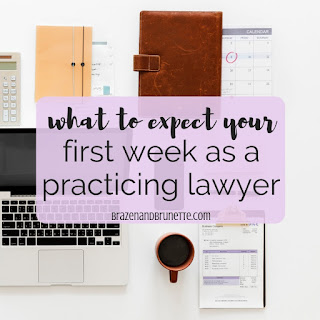Anyways, I can't believe it's been a full year since I did my Top Blog Posts of 2017! This has been a whirlwind of a year and I'm so grateful for what 2018 brought me. This year I spent a semester interning as corporate counsel, graduated law school, passed the Bar exam, became a licensed attorney, and got a job!! It has been a long, long journey to get here but I am so blessed to finally be where I knew I was supposed to be all along. I'm getting sentimental so I'll stop, but I truly do what to thank all of y'all for coming back week after week, following along with my road-to-lawyer story, and sharing yours with me. Honestly, this blog will forever be my favorite part about law school and I have y'all to thank for that!! Okay so now here's a recap of the top 10 posts that y'all loved this year....
To summarize this post, look for a backpack that is sturdy, spacious, and strong. It's funny because I spent 3 years of my life rolling my eyes at people who used the briefcase-on-wheels as their backpack but guess what Christmas present I got really excited for?? Yep.... a briefcase on wheels. But I still stand by my opinion that these are better for carrying a huge case file into a hearing than taking with you to class every day.
Not much has changed between what I bring into work every day now as an actual lawyer and what I brought in as an intern. I definitely don't have time to bring a Kindle and read anymore because my lunches are spent either watching daytime court TV shows with my coworkers and being grateful that our clients aren't like that and actually doing work for my clients because lunch time is when a lot of them have the free time to communicate with me. I originally intended to use my first big-girl paycheck to buy a new purse as a present to myself for this past year, but student loans happened first so instead I'm putting away a little each month.
One of my most-worn work tops is included in this post! This post is actually one of my favorites from this year because it features affordable pieces that a broke law student can afford to help get her lawyer wardrobe going. We've all been there when you have your first interview or 1L competition where you need some professional clothes, but your bank account is saying "bitch, please." If you missed this post, I promise you it'll be worth it to go check it out.
This is advice that I received in 2018 that I still try to live by every single day because it really is super important. As we're starting out our law career, we're establishing a reputation that will follow us for the rest of our career, and you only get one chance to make a first impression. I take this to heart because I want to be respected in the legal community. If you'e a 3L, I highly recommend that you consider what you want your personal brand to be.
Hopefully you don't need this post, but this is actually really perfect timing to reshare this. If you do need this post, just remember that plenty of successful lawyers were on academic probation at some point and you really can turn your GPA around. But even if you have anything less than a 4.0, this post has some tricks I picked up on how to slowly climb your way up the GPA ladder.
If you're a pre-law reader, please please please go read this! All the time I'm asked for LSAT advice and while this isn't the advice you wanted, it's the advice you didn't realize you needed. I promise I have plans to do another LSAT related post, but for now read this and send it to your other pre-law friends because it's probably something y'all hadn't thought about yet.
Moment of sadness because I just realized that I will literally never get to graduate again. Followed by a moment of guilt because I just realized that I never blogged about my law school graduation, so I guess that's a post for 2019. Funny story about what I wore to graduation, another one of my classmates wore the exact same dress in the same color and everything! I wasn't annoyed in the slightest because 1) no one would see our dresses anyways and 2) someone wearing my dress just reaffirmed my decision that it was a perfect dress to graduate in lol.
I have one law school graduation to attend in 2019 and I'm already starting to shop around for what I'm going to wear. What I love about this post is that it's similar to #3 on this list and everything is from.... Amazon! It seems like there's always another graduation to go to for one of your friends or family members. And who else remembers the scene from the Lizzie McGuire movie where Kate screams out "Lizze McGuire you are an outfit repeater!" at graduation?? Still to this day I won't rewear an outfit to two graduation ceremonies lol. So if you're like me and need a bunch of cute outfits for this spring, this post has lots of affordable options.
And we're done! Thank you guys for making these posts your top 10 most read posts! Like I've mentioned already today, I have lots of post ideas that I'm working on for 2019, but the most read posts are the ones that y'all requested because you know what you want to read. So please if you have anything you want to see, go ahead and comment on this post or use the "questions and suggestions" box on the bottom right to email me an idea.





































